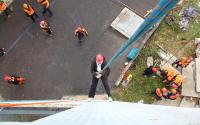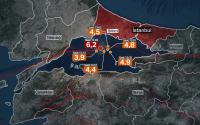Common Dreams / Published on Thursday, December 18, 2003 by the International Herald Tribune
Contrary to what many are saying, Saddam Hussein's capture is a negative omen for President George W. Bush's re-election campaign and points toward continuing disorder and resistance in Iraq.
Saddam's ignominious circumstances when he surrendered - hiding in a hole in the ground when he wasn't living in a shed heaped with dirty clothes, eggshells and unwashed pans, with a refrigerator stocked with candy bars and soft drinks - made it clear to all that the resistance to the American occupation was not being commanded from there. So it is wishful thinking to expect his capture alone to slow or end the violence. It may spur the resistance.
As long as the Shiite majority thought there was a remote possibility that he could return to power, and with him the Baath party apparatus whose remnants survive throughout the country, they had reason to stay on good relations with the American occupation authority hunting him down.
With Saddam gone, the Shiite authorities are free to express their real ambition: power in a new Iraq proportionate to their majority in the population.
Until now, the most important Shiite leaders have remained, objectively, allies, or at least neutrals, in Washington's effort to control the country.
They now will become active players in the emerging political power struggle. Since they can bring millions into the streets, as demonstrators or as fighters, practicing a version of Islam with a powerful emotional component of suicidal self-sacrifice, they are potentially a more important force than Saddam could ever have mobilized as underground leader or as martyr.
The minority Sunni community, which had dominated Iraq since the time of the Ottoman Empire, has more urgent reason than ever to fight to regain power and privilege.
A new government might be a federation in which the communities - Sunni, Shiite and Kurdish, but also Turkmen, Christians of several denominations and others - coexist on representative and more or less democratic terms.
The United States might prefer this solution, at least in principle, but would also probably expect (or be needed) to remain in Iraq in order to maintain the balance. A continued American presence would run into the obstacle of Iraqi nationalism, which this war has inflamed, and rob the Shiites of the dominant political role.
A second possibility is restored centralized and probably authoritarian government, quite possibly with the better-educated Sunni community back on top. Americans are accustomed to dealing with this kind of government in the Arab world. Nationalism and sectarian interests again are the obstacles.
Shiite majority rule would incorporate a powerful bias toward theocratic government of the Iranian kind, which is what Washington does not want.
On the other hand, there is a limit on what the United States can do, short of continued direct rule. The June departure is supposed to end with a sovereign Iraq on its way to democracy, although how this desirable end is to be accomplished I do not know.
An Iraqi author, Zaki Laidi, sums it up by saying that "the Shiites, who in the majority seem to have at least implicitly backed the American intervention, cannot find durable political legitimacy other than by opposing the United States, while the Sunnis, who lost most in the American intervention, would be Washington's best allies against the Shiites' taking power."
As for Bush, Saddam's capture symbolically changes the president from war leader to the builder of a new Iraq. Electorally, he is likely to regret this change.
If questioning Saddam Hussein doesn't produce the famous weapons of mass destruction that were threatening Jerusalem, and British and American bases in the region - not to mention New York and Washington - the question of what the war was all about is reopened.
The failure to get new information will confirm what so far has been the unanimous testimony of Iraqi scientists and officials, who no longer have any reason to lie and every reason to tell the truth: The weapons programs were all terminated after the first Gulf War. Washington, significantly, had already let the issue of weapons of mass destruction drop even before Saddam's capture.
Had Karl Rove, Bush's chief domestic political adviser, been consulted in time, he probably would have told the president to seize Saddam but hide him until the first week of next November, and produce him - trussed on a turkey platter - on the eve of the election. But as 600 soldiers were involved in the capture and rumors fly, that was not practical.
As things stand, the triumph of Saddam's capture has 11 months during which to ebb. By next November it risks being covered over by an accumulation of bad news from a liberated but unpacified Iraq.






